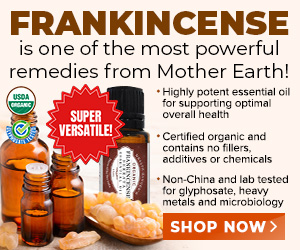Teenage girl dies of Toxic Shock Syndrome after doctors mistook illness for Norovirus
Tuesday, February 02, 2016 by: Julie Wilson staff writer
Tags: Toxic Shock Syndrome, tampon use, glyphosate

(NaturalNews) Though rare, toxic shock syndrome is not unheard of. It primarily affects young menstruating women, unaware of the hidden dangers of using tampons. Sometimes fatal, TSS is an infection caused by the bacteria Staphylococcus aureus, which can begin to colonize, reaching dangerous levels in the body through prolonged tampon use.
The bacteria produces harmful exotoxins that upon entrance into the bloodstream cause sudden fever, vomiting or diarrhea, muscle aches, confusion, headaches and seizures, according to the Mayo Clinic.
The disease mainly affects women aged between 13 and 25, because they are the most likely group to wear tampons. Risks for the bacterial infection increase when a person wears a tampon for an extended period of time.
Half of TSS cases linked to tampon use
A British teen lost her life to the disease last year, after doctors misdiagnosed her as having Norovirus, a nasty stomach bug, and told her to keep away from hospitals. Only after her condition continued to deteriorate, prompting her family to rush her back to the hospital, did doctors realize their mistake.But by then it was too late.
The 13-year-old Jemma-Louise Roberts passed away from a brain bleed while on a heart and lung machine. Blood tests later showed evidence of the bacteria Staphylococcus aureus. Reports say the girl began using tampons as a more convenient way to mange her periods during swim meets. Jemma-Louise was a competitive breaststroke swimmer, according to the Manchester Evening News.
Determined to spread awareness about TSS, Louise's mother Diane Roberts is speaking out.
"TSS used to be talked about in the '80s, but you never hear it now," said Roberts. "My husband had never heard of TSS — if one dad reads this and his daughter falls ill, it could save her life."
Roberts is right. TSS is rarely talked about since its decline in the 1980s, due to public health intervention. The disease was first linked to high absorbency tampons (a brand called Rely), made by Procter and Gamble in 1978. Rely tampons were touted for their ability to "contain the menstrual flow without leaking or requiring frequent replacement," says News-Medical.net.
Health officials ignore risks associated with tampons
However, Rely soon became associated with an increased risk for TSS. Its occurrence became so common in menstruating women that it was considered an epidemic. As a result, Procter and Gamble were forced to recall their Rely tampons. Though less common, the disease still poses a threat to women, because high-absorbency tampons are still on the market today.Public service announcements regarding the dangers of wearing a tampon for prolonged periods helped reduce the disease's occurrence. But today, as Roberts pointed out, we are rarely reminded of the dangers.
Due to their makeup, tampons pose other health risks, which are also less-talked about. Most tampons are made of a combination of viscose rayon (synthetic fibers) and cotton. This raises cause for concern, considering the process for producing man-made fibers involves them being treated with harsh chemicals, and because the majority of cotton harvested in the U.S. is genetically engineered, meaning it's laden with toxic herbicides.
In November last year, researchers from Argentina discovered that 85 percent of cotton-based feminine hygiene products contained glyphosate, the primary ingredient in Monsanto's Roundup. The findings are alarming, considering glyphosate was officially declared carcinogenic by the World Health Organization last spring.
Tampons aren't the only products laced with herbicides; sterile cotton gauze, cotton swabs and wipes, also tested positive for glyphosate.
"The study looked at a sampling of products from pharmacies and supermarkets in the area of La Plata, and analyzed cotton swabs, gauze and articles for feminine use. The results from all commercial products detected 85% glyphosate and 62% AMPA," researchers said. "Almost 100% of the cotton produced in Argentina is transgenic and glyphosate applications are made while the cocoon is open."
The best way for women to stay protected against TSS is to change tampons frequently, and to avoid using high-absorbency tampons altogether. Educating young women about the risks and symptoms of TSS can also save lives.
Sources:
News.Yahoo.com
ManchesterEveningNews.co.uk
NaturalNews.com
News-Medical.net
News-Medical.net
Toxic Shock Syndrome at FETCH.news
Get independent news alerts on natural cures, food lab tests, cannabis medicine, science, robotics, drones, privacy and more.
Take Action: Support Natural News by linking to this article from your website
Permalink to this article:
Embed article link: (copy HTML code below):
Reprinting this article:
Non-commercial use OK, cite NaturalNews.com with clickable link.
Follow Natural News on Facebook, Twitter, Google Plus, and Pinterest
- Newly released JFK files reveal Pentagon's role in creating Lyme disease and covid in the same lab
- Analysis: The coming economic collapse, a mass uprising and Trump's three secret weapons to halt the growing revolt
- BIGGEST SCAM: You pay income tax, then taxes on purchases, then personal property tax on what you own that you already paid taxes on with taxed money
- American food is the MOST TOXIC “FOOD” on earth
- EXPOSED: Antifa and IRS collude to shield radical funding from taxation
- The flu vaccine paradox: Are we making things worse?
- A lack of integrity in Academia: Harvard professor found GUILTY of fraudulent research to promote CRT theory
- Big Pharma's $8 Billion bribery scheme exposed: how doctors are pushed to prescribe junk science, not heal
- Heads up! List of food shortages expected in 2025 as the campaign of forced starvation continues to be waged against the American people
- Reclaim your health: How midlife exercise reverses years of inactivity
- Trump reverses course on Gaza plan, says “nobody is expelling Palestinians”
- Florida takes a stand: DeSantis proposes permanent ban on mRNA vaccine mandates
- Mike Adams Sermon 66: God will DESTROY ISRAEL for its wickedness
- Elon Musk: Aliens could be here on Earth RIGHT NOW
- OpenAI whistleblower who dissented against how the company trained ChatGPT found dead
- Beyond consequence
- Discovery of Texas GOP representative living in retirement home amid health challenges and congressional absence sparks uproar
- Dr. Mike Yeadon releases 15-minute testimony - WATCH - about genocidal intent of COVID “vaccines”
- Reclaim your health: How midlife exercise reverses years of inactivity
- A lack of integrity in Academia: Harvard professor found GUILTY of fraudulent research to promote CRT theory
- Space war brewing? Russia threatens to destroy Starlink satellites
- EPA advisor admits the agency is funneling billions to climate groups ahead of Trump’s return to White House
- Elon Musk: Aliens could be here on Earth RIGHT NOW
- Big Pharma's $8 Billion bribery scheme exposed: how doctors are pushed to prescribe junk science, not heal
- Historian warns Israel may be entering an “IRREMEDIABLE DECLINE”
- Trump reverses course on Gaza plan, says “nobody is expelling Palestinians”
- Mike Adams Sermon 66: God will DESTROY ISRAEL for its wickedness
- Rep. Nancy Mace introduces bill to ban biological males from female facilities on federal property
- New York politicians push bill allowing governor to indefinitely detain the unvaccinated on a whim
- RFK Jr.'s SSRI antidepressant investigation sparks liberal meltdown, exposes Big Pharma's dangerous game
- 5 Simple steps to boost your brainpower: How to strengthen executive function in a distracted world
- Mark Zuckerberg's REAL NAME is Jacob Greenberg and he is the GRANDSON of DAVID ROCKEFELLER, hence the POWER of FAKEBOOK
- Survival 101: Effective EMF blocking techniques
- Sales of survival bunkers rise following Russia’s use of the Oreshnik hypersonic ballistic missile
- Trump Administration cuts 2,000 USAID jobs, places most employees on leave in sweeping reform effort
- Pilots report mysterious lights 'moving at extreme speeds' across Oregon skies
- EPA advisor admits the agency is funneling billions to climate groups ahead of Trump’s return to White House
- The Health Ranger releases “Vaccine Zombie” song and music video, using AI-animated zombies for the music video
- The pandemic as a tool for INDOCTRINATION: Understanding “The Indoctrinated Brain” by Dr. Michael Nehls
- California's social media censorship law struck down: A victory for free speech or a threat to online safety?
- Mike Adams releases new song and music video: Nothing More Disgusting Than a Globalist
- Congratulations to the FULLY UNVACCINATED as you resisted the COVID-19 PROPAGANDA MACHINE fueled by over $100 BILLION
- Mike Adams releases country western hit single: Goin’ Back in Time is Comin’ Home
- Dr. Mike Yeadon releases 15-minute testimony - WATCH - about genocidal intent of COVID “vaccines”
- RFK Jr. clears key hurdle: Sen. Susan Collins backs controversial HHS nominee, signaling a new era for health policy
- Mike Adams releases music poetry sensation: A Child of God
- Unpacking the Lies That We’ve Been Fed – new song and music video released by Mike Adams, the Health Ranger
- Trump administration takes on global censorship: A new frontier for free speech advocacy
- Ex-FBI Chief EXPOSES disgraceful government coverups of Oklahoma City Bombing, Kennedy assassinations, 9/11 WTC, and "Terrorism" as plot to destroy Constitution
- Federal judge backs Trump's mass firings, clearing path for government downsizing
- Florida takes a stand: DeSantis proposes permanent ban on mRNA vaccine mandates
- Michigan sheriff announces criminal investigation into 2020 election crimes, Dominion Voting Systems
- “Why we influenced the 2020 elections”: Facebook files reveal the coordinated effort to bury the Hunter Biden laptop story
- Bush tomato: A mighty superfood that supports digestive health
- Red Cross issues warning to stop blood plasma donations from vaccinated people
- Scientists confirm: GENIUS brain function can be spontaneously unleashed in humans without any apparent cause
- EPA advisor admits the agency is funneling billions to climate groups ahead of Trump’s return to White House
- HYSSOP: What research reveals about the health benefits of this ancient holy herb
- Two containers with completed ballots fall out of truck in Florida
- Fully vaccinated about to see “tsunami” of illness and death, warns virologist
- Today I asked our AI language model “Neo” about which phytonutrients or phytochemicals can block the spike protein related to SARS-CoV-2 … Here is what it answered…
- Global leaders unite to clamp down on “misinformation” with UN-backed Cascais Declaration
- BREAKING: 2025 NDAA authorizes mandatory military draft of WOMEN across America… as Pentagon pursues global NUCLEAR war with both Russia and China at the same time
- Michael Yon warns of a ZIONIST TAKEOVER in Trump’s second administration
- BOMBSHELL: DNA testing kits are a SCAM to develop ethnic-specific bioweapons
- Ozempic and Wegovy weight loss drugs are injectable LIZARD VENOM PEPTIDES that may unleash a devastating wave of organ failure… side effects align with symptoms of SNAKE BITES
- Israeli soldiers accused of even more torture and abuse in the West Bank
- These 13 countries just signed an agreement to engineer a global FAMINE by destroying food supply
- NASA admits that climate change occurs because of changes in Earth’s solar orbit, and NOT because of SUVs and fossil fuels
- RFK Jr. clears key hurdle: Sen. Susan Collins backs controversial HHS nominee, signaling a new era for health policy
- Sermon 30: How Jesus reveals Caesar’s FAKE CURRENCY and FALSE AUTHORITY
- Coriander seeds: Ancient medicine backed by modern science
Science News & Studies
Medicine News and Information
Food News & Studies
Health News & Studies
Herbs News & Information
Pollution News & Studies
Cancer News & Studies
Climate News & Studies
Survival News & Information
Gear News & Information
News covering technology, stocks, hackers, and more



"Big Tech and mainstream media are constantly trying to silence the independent voices that dare to bring you the truth about toxic food ingredients, dangerous medications and the failed, fraudulent science of the profit-driven medical establishment.
Email is one of the best ways to make sure you stay informed, without the censorship of the tech giants (Google, Apple, Facebook, Twitter, YouTube, etc.). Stay informed and you'll even likely learn information that may help save your own life."
–The Health Ranger, Mike Adams












































